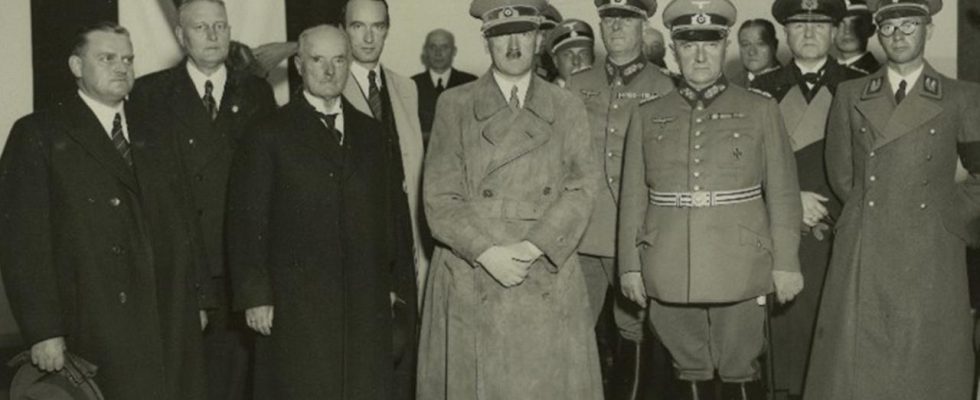For a long time little was known about Alfried Krupp’s relationship with the National Socialists. A research project by the Krupp Foundation is now revealing how deeply involved the steel entrepreneur was in National Socialism.
The involvement of the Krupp steel group in the crimes of the National Socialists is widely known today. During the Second World War, the company was not only active as a manufacturer of weapons for the German war of aggression – thousands of forced laborers, including concentration camp prisoners, were also exploited in the Krupp works.
According to Golo Mann “quite a zero”
However, it remained unclear for a long time what attitude the then CEO Alfried Krupp had towards the National Socialists. In the 1970s, historian Golo Mann attempted a biography of Krupp. His conclusion: The last Krupp was “not bad, but pretty much nothing”. Even more recent accounts provide little information about Krupp’s attitude towards National Socialism. Rather, they paint a picture of a pale, politically incomprehensible entrepreneurial personality.
For this reason, the Krupp von Bohlen und Halbach Foundation commissioned a research project on Alfried Krupp’s Nazi involvement last year. A team led by the Marburg historian Eckart Conze sifted through numerous archives for more than a year. The results of the research have now been presented in Essen.
To person
Alfried Krupp von Bohlen und Halbach, born in 1907, took over Friedrich Krupp AG in Essen as the sole owner in 1943. In the course of the Nuremberg Krupp trial in 1948, he was sentenced to a long prison term. In the grounds for the judgment, he was charged in particular with the exploitation of forced laborers during the Second World War.
After his early pardon, Krupp took over management of the company again in 1953. Krupp pledged to stop producing weapons. At the same time, he appointed Berthold Beitz as General Manager. Beitz had previously saved several Jewish people from deportation as a manager in the oil industry. Alfried Krupp died in Essen in 1967.
Good contacts with members of the Nazi regime
The final report shows that Alfried Krupp was a member of several Nazi organizations. In 1931 he became a supporting member of the SS and in 1938 he joined the NSDAP. However, this accession did not take place on their own initiative, but “on Hitler’s direct orders,” according to the report. However, the fact that Krupp joined the party relatively late does not indicate a skeptical or even negative attitude towards the NSDAP.
On the contrary, the historians found indications that Alfried Krupp maintained good contacts with Armament Minister Albert Speer and other high-ranking members of the Nazi regime. He also expected economic benefits from his support for the National Socialists. Krupp was part of an economic elite “who were willing to exploit German wartime successes and occupation for their own benefit”.
Alfried Krupp von Bohlen und Halbach (dock, rear left) during the Krupp trial in Nuremberg, 1947
Group exploited en masse forced labourers
Hardly any other German company employed as many forced laborers as the Krupp company during the Second World War. The frequently quoted figure of 100,000 people is, according to the historians, far too low, “not only because the factor of fluctuation has not been sufficiently weighted so far, but also because companies belonging to the group that employed forced laborers are missing from the group statistics”.
The Krupp management also deliberately planned to use forced laborers. The availability of forced laborers from the concentration camp was even “the decisive factor” for the selection of the production sites in Markstädt and Auschwitz. Although Alfried Krupp was aware of their catastrophic living conditions, for him “the interest in the workforce” was the focus.
Proximity to the Nazis even after the war
Even after his imprisonment and return to the top of the group in 1953, Alfried Krupp continued to maintain contact with well-known National Socialists, including Fritz Schleßmann, former SS Obergruppenfuhrer and deputy Gauleiter of Essen.
Together with other companies from the iron and steel industry, he also participated in the so-called “Landsberg-Hilfe”, which supported ex-prisoners in the prison in Landsberg. More than half had SS backgrounds and more than a third had been convicted of crimes committed in concentration camps. Between 1951 and 1957, 100,000 Deutschmarks were raised.
Krupp Foundation wants to continue project
Against this background, it is not surprising that the team, led by the Marburg historian Conze, could not find any “signs of critical self-reflection” in Alfried Krupp. Nonetheless, historians stress the need for further research.
This is another reason why the project should be continued. In an anthology, Krupp’s socialization through his family, his role as an entrepreneur and private individual will be examined more closely. The Krupp Foundation wants to support the project, which is designed to last two years, with up to 150,000 euros.

